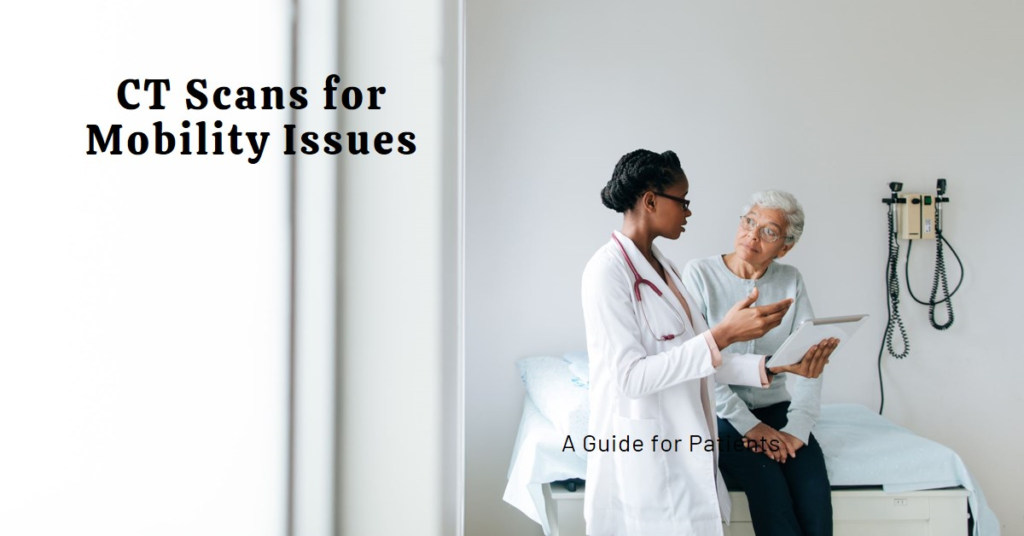A CT scan, short for computed tomography scan, is a non-invasive imaging test that uses X-rays to create detailed cross-sectional images of your body. This vital tool helps diagnose a wide range of medical conditions, from internal injuries and infections to bone fractures and tumors. However, undergoing a CT scan can present challenges for patients with mobility limitations or those residing in assisted living facilities.
The Importance of CT Scans for Patients with Mobility Issues
Statistics show that adults aged 65 and over account for a significant portion of CT scan procedures [1]. This demographic is also more likely to have mobility issues. While a CT scan itself is painless, the process of getting into the scanning machine and remaining still during the procedure can be difficult for those with limited mobility.
Addressing Concerns: How CT Scan Centers Accommodate You
Fortunately, many CT scan centers understand these challenges and have implemented measures to ensure a smooth and comfortable experience for all patients. Here’s a breakdown of how they can accommodate you:
- Wide-Bore Scanners: Modern CT scanners often come with wide-bore openings, making it easier for larger patients or those with claustrophobia to undergo the scan.
- Transfer Assistance: Trained staff is available to assist patients with transferring safely from their wheelchairs or walkers to the scanning table. They may use specialized lifts or hoists to ensure a comfortable transition.
- Adjustable Scanning Tables: Some CT scan machines have tables that can tilt or move to accommodate patients with limited mobility. This allows for a more comfortable position during the scan.
- Sedation Options: In certain situations, doctors may recommend mild sedation for patients who experience anxiety or difficulty remaining still during the scan.
The Benefits of Mobile CT Scans for Assisted Living Residents
For patients residing in assisted living communities, traditional CT scan centers might pose logistical challenges. Here’s where mobile CT scan services come in. These services bring the CT scanner directly to the assisted living facility, eliminating the need for transportation and minimizing patient discomfort.
Mobile CT scans offer several advantages:
- Reduced Risk of Transfer: Residents don’t have to be transported to an unfamiliar environment, potentially reducing stress and the risk of falls or injuries associated with transfers.
- Convenience for Caregivers: Mobile CT scans free up staff time at assisted living facilities, allowing them to focus on resident care.
- Faster Diagnosis and Treatment: Having on-site CT scan services allows for quicker diagnoses and treatment plans, potentially improving patient outcomes.
Finding a Nearby CT Scan Center:
When searching for a CT scan center, it’s crucial to consider your specific needs and preferences. Here are some tips:
- Inquire about accessibility features: Ask about the availability of wide-bore scanners, transfer assistance, and adjustable tables.
- Location and transportation: Consider the center’s location and whether transportation assistance is offered.
- Insurance coverage: Ensure the center accepts your insurance and inquire about out-of-pocket costs.
How Ecotown Diagnostics Can Help (consider mentioning location and contact details here)
[Consider adding a sentence or two about Ecotown Diagnostics’ services here, highlighting their focus on patient comfort and accessibility, or mentioning their mobile CT scan services if applicable.]
FAQs
- What can I expect during a CT scan?
A CT scan technologist will explain the procedure and answer any questions you may have. You’ll likely be asked to remove any jewelry or clothing with metal fasteners. You’ll then be positioned on the scanning table, and the machine will rotate around you, capturing multiple X-ray images. The entire process typically takes less than 30 minutes.
- Will I feel any pain during the CT scan?
The CT scan itself is painless. However, you might feel some discomfort from lying still, especially if you have limited mobility.
- What should I wear for a CT scan?
Wear loose, comfortable clothing free of metal zippers, buttons, or clasps.
- Can I eat or drink before a CT scan?
Depending on the type of CT scan you’re undergoing, you may be instructed to avoid eating or drinking anything for several hours beforehand. It’s important to follow your doctor’s specific instructions.
- What happens after a CT scan?
The CT scan technologist will process the images and send them to your doctor for interpretation. Your doctor will then discuss the results with you and determine the next steps in your treatment plan.
Conclusion
Undergoing a CT scan with mobility limitations can be a concern. However, with advanced technology and dedicated healthcare professionals, CT scan centers are well-equipped to accommodate your needs and ensure a safe and comfortable experience. By understanding the available options, such as wide-bore scanners, transfer assistance, and mobile CT scans for assisted living residents, you can approach the procedure with confidence. Remember, clear communication with your doctor and the CT scan center staff is key to a smooth process. Don’t hesitate to ask questions and voice any concerns you may have.
Would you discuss your mobility limitations with your doctor before scheduling a CT scan?
Also know Understanding Treadmill Test Risks for Seniors: Benefits & Precautions
